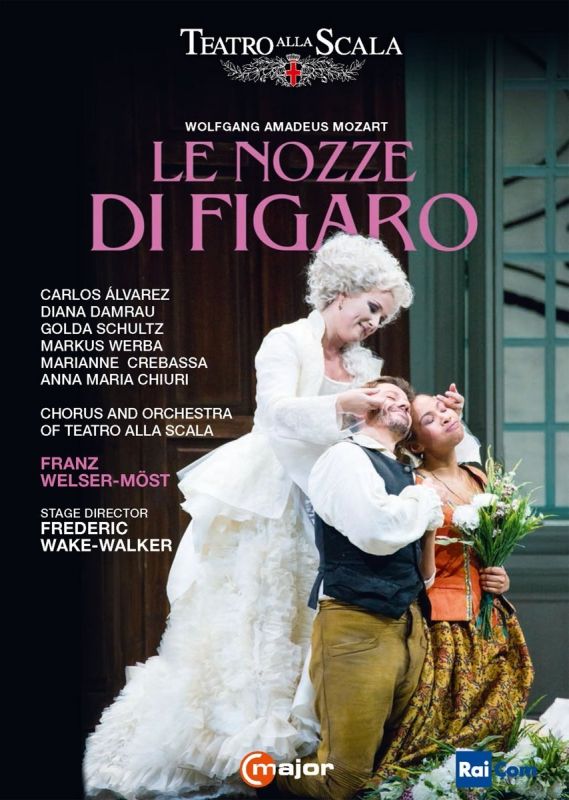MOZART Le nozze di Figaro (Welser-Möst)
View record and artist detailsRecord and Artist Details
Composer or Director: Wolfgang Amadeus Mozart
Genre:
Opera
Label: C Major
Magazine Review Date: 02/2018
Media Format: Digital Versatile Disc
Media Runtime: 214
Mastering:
DDD
Catalogue Number: 743180

Tracks:
| Composition | Artist Credit |
|---|---|
| (Le) nozze di Figaro, '(The) Marriage of Figaro' |
Wolfgang Amadeus Mozart, Composer
Andrea Concetti, Bartolo; Antonio, Bass Anna Maria Chiuri, Marcellina, Mezzo soprano Carlos Alvarez, Count Almaviva, Baritone Diana Damrau, Countess Almaviva, Soprano Francesca Manzo, 1st Peasant Franz Welser-Möst, Conductor Golda Schultz, Susanna, Soprano Kresimir Spicer, Don Basilio; Don Curzio, Tenor Kristin Sveinsdottir, 2nd Peasant Marianne Crebassa, Cherubino, Mezzo soprano Markus Werba, Figaro, Baritone Milan La Scala Chorus Milan La Scala Orchestra Theresa Zisser, Barbarina, Soprano Wolfgang Amadeus Mozart, Composer |
Author: Neil Fisher
The ambiguities start during the Overture, in which zany wigged ladies push and prod the scenery, apparently overseen by Figaro (Markus Werba); when period decoration is evoked by Antony McDonald’s ever-whirling designs, it’s through photos beamed on to plain sets. And the costumes! La Scala’s budget for the punk-baroque frocks alone would probably cover the dowries of a hundred Susannas, although in chic Milan you can almost hear the tutting from the stalls as gentlemen revellers suddenly reveal their teeny gold shorts. And who invited the silently cavorting chap with the ape mask?
It’s too much monkeying around. Wake-Walker’s stagecraft isn’t terrible, but nor does it tell us very much we didn’t know. The tension between artifice and naturalism never resolves itself, and, as the drama moves to its finale (the garden denouement is played with lights up and with no proper garden) it becomes frustrating to see fine singer-actors with their wings clipped.
Still, Franz Welser-Möst is clearly keeping his head while all about him sometimes lose theirs: at first the orchestra sound a little stiff, but as the night goes on Welser-Möst unbends and the combination of his Austrian grace and the Italian orchestra’s warmth is appealing; so is the colourful continuo accompaniment of fortepiano and cello. It’s good, too, to have native wit in Andrea Concetti’s grizzled Bartolo and Anna Maria Chiuri’s fruity Marcellina. Krešimir Špicer picks up Don Basilio’s Act 4 aria, a shaggy-dog story that’s no less perplexing each time it’s re found, however enthusiastically picer attacks it. Marianne Crebassa’s limpidly sung Cherubino is delightful.
Some Figaro productions pair off Figaro and the Count as if they are rival stags. But there’s no macho contest between a preening fop of a Count (Carlos Álvarez, vocally authoritative) and the pragmatic fixer, Werba’s Figaro, sharp and amiable, if lacking some weight in his lower register. The differences between Diana Damrau’s entrancing Countess and Golda Schultz’s sparkling Susanna lend extra piquancy, however – Damrau is all silver and silk, imbuing her arias with real drama and pathos; Schultz’s soprano is cream and gold – and the two heart-stoppingly intertwine in the Letter duet. Thankfully, nothing intrudes on this blissful (and rare) moment of stillness.
Discover the world's largest classical music catalogue with Presto Music.

Gramophone Digital Club
- Digital Edition
- Digital Archive
- Reviews Database
- Full website access
From £8.75 / month
Subscribe
Gramophone Full Club
- Print Edition
- Digital Edition
- Digital Archive
- Reviews Database
- Full website access
From £11.00 / month
Subscribe
If you are a library, university or other organisation that would be interested in an institutional subscription to Gramophone please click here for further information.




